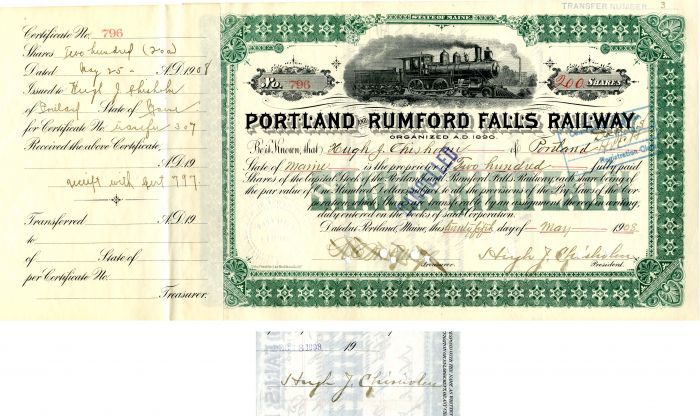Portland and Rumford Falls Railway Issued to Hugh J. Chisholm
Inv# AG2053 Stock
Stock Issued to and signed twice by Hugh J. Chisholm.

Hugh Joseph Chisholm I (May 2, 1847 – July 1, 1912) was a Canadian industrialist who later became a citizen of the United States. He was born in Chippawa, Ontario, to parents of Scottish ancestry. His early years as an entrepreneur in the news distribution business provided a foundation for his later accomplishments in the pulp and paper industry. His founding and leadership of pulp and paper, fibre-ware, and light and power companies as well as banks and railways made him a dominant figure in Maine industry. His legacy went beyond his reputation as a capitalist, however; he created the first forest management program for International Paper Company and developed a planned community for the workers in his mills which was a model for the nation. Hugh J. Chisholm was the fifth of ten children of Alexander Chisholm and Mary Margaret Phelan of Niagara-on-the-Lake in Ontario, Canada. He attended school there until he was thirteen, when his father’s death made it necessary for him to leave school to help support the family. In Toronto, he found employment as a newsboy distributing newspapers to passengers on the Grand Trunk Railway and the steamboats, where he made friends with Thomas Edison, who was a newsboy on a nearby line. An entrepreneur from an early age, Chisholm soon began buying his own copies of the papers, rather than selling them as an agent for another company. As his earnings grew, he was able to attend business classes at the Commercial College of Bryant and Stratton. In 1861, his brother joined him and formed Chisholm Brothers, which distributed papers over much of Canada and the Northeastern United States. By the time he was sixteen, he was able to buy out his former employer, hiring over two hundred newsboys to sell papers, magazines and books to railway and steamboat customers. This company developed into Chisholm Brothers Publishing in Portland, Maine. With his knowledge of what customers were reading, Chisholm Brothers began printing travel guides and founded a lithograph company in Portland, Maine, moving to half-tone photographs and then eventually, in 1888, to picture postcards. Chisholm became a U.S. citizen and moved to Portland in the mid-1870s. After a foray into patenting and manufacturing fibre-ware products, Chisholm became interested in paper and pulp, and, with other capitalists whom he interested in his projects, started several pulp and paper companies in western Maine, including the Umbagog Pulp Company; Otis Falls Pulp and Paper Co.; Rumford Falls Paper Company, Somerset Fibre Company the Oxford Paper Company, the Rumford Falls Sulfite Company; the Continental Bag Company and, with the Hon. William A. Russell co-founded the International Paper Company in 1896. The Otis Falls Pulp Company mill in Jay, built in 1888, was then the third largest paper mill in the country. The Oxford Paper Company’s mill in Rumford began producing paper in 1901, and subsequently produced all postcards for the United States Post Office. This mill became the largest bookpaper mill in the world under one roof, and has operated continuously since that time under several different companies. Chisholm was the second president of International paper company, succeeding its first president The Hon. William Augustus Russell who died suddenly in January 1899 after founding IP with Chisholm which was then the largest paper company in the world. Chisholm succeeded W. A. Russell as president from 1899 to 1907. The combined efforts of William A. Russell and Hugh J. Chisholm had eventually brought together 30 pulp and paper mills from across US and Canada. Chisholm went on to initiate the first forest management program for that company and developed a close relationship with the Yale University School of Forestry. Chisholm’s entrepreneurial interests also included founding and leading the Livermore Falls Iron Foundry; Rumford Falls Power Company; Portland and Rumford Falls Railway, and the Rumford Falls and Rangeley Lakes Railroad.
Chisholm, with George N. Fletcher of Detroit and Charles D. Brown of Boston, acquired considerable land around Pennacook Falls on the Androscoggin River in Maine, where they planned the town of Rumford Falls. It grew up around the mills very much in accord with their plans. Chisholm had a particular interest in providing comfortable housing for the many mill workers who were attracted by employment from Europe, Canada, and other parts of the United States, and to that end researched mill housing initiatives at that time. He was aware of the slums and stacked tenements near mills in Manchester, New Hampshire and Lawrence and Lowell, Massachusetts, and became convinced that satisfactory comfort and amenities were both practical and enlightened. He established the Rumford Realty Company and began construction of one of the first planned communities in Maine, and a model for the nation. The large brick and slate duplex houses with manicured lawns were to be arranged around treed parks. Named after his ancestral home in Scotland and designed and built by architect Cass Gilbert, Strathglass Park in Rumford provided housing for many mill workers. His interest in developing a community in which people would want to live extended to other aspects of the town as well. In 1911, he founded the Rumford Mechanics Institute, a social and recreational center for residents which was partially supported through membership dues.
A stock certificate is issued by businesses, usually companies. A stock is part of the permanent finance of a business. Normally, they are never repaid, and the investor can recover his/her money only by selling to another investor. Most stocks, or also called shares, earn dividends, at the business's discretion, depending on how well it has traded. A stockholder or shareholder is a part-owner of the business that issued the stock certificates.









Ebay ID: labarre_galleries